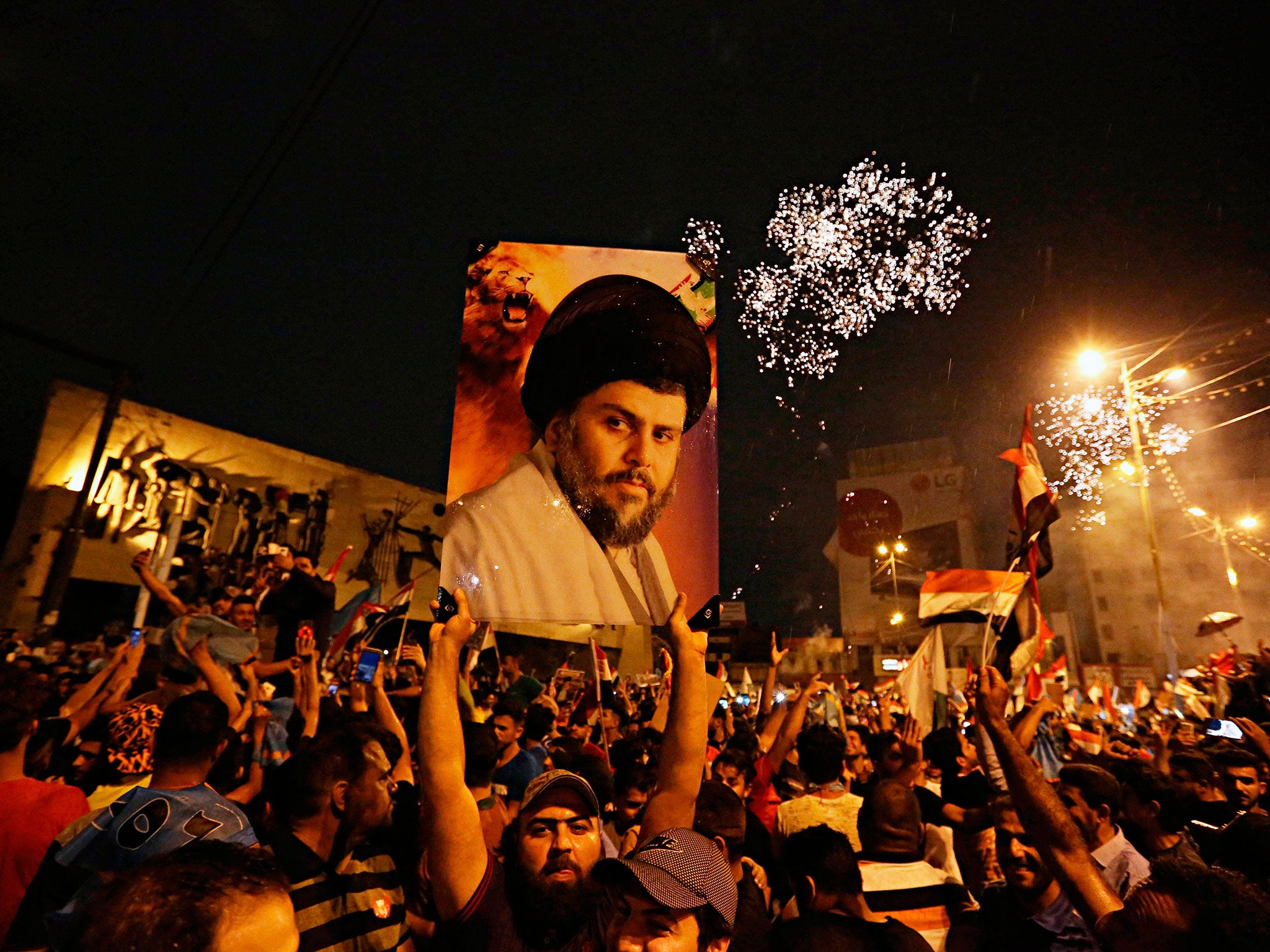Iraq’s new kingmaker has transformed himself into an anti-corruption, anti-Iranian nationalist
The emergence of Shia cleric Muqtada al-Sadr’s group as the largest party in Iraq’s election means he holds the power in Baghdad and represents a new direction for a country beset by challenges but hungry for change

Your support helps us to tell the story
From reproductive rights to climate change to Big Tech, The Independent is on the ground when the story is developing. Whether it's investigating the financials of Elon Musk's pro-Trump PAC or producing our latest documentary, 'The A Word', which shines a light on the American women fighting for reproductive rights, we know how important it is to parse out the facts from the messaging.
At such a critical moment in US history, we need reporters on the ground. Your donation allows us to keep sending journalists to speak to both sides of the story.
The Independent is trusted by Americans across the entire political spectrum. And unlike many other quality news outlets, we choose not to lock Americans out of our reporting and analysis with paywalls. We believe quality journalism should be available to everyone, paid for by those who can afford it.
Your support makes all the difference.The seismic change in last week’s election reflects deep structural shifts in Iraqi society. Muqtada al-Sadr’s party won the most MPs, although not a majority and he himself did not stand. But his apparent transformation from a sectarian anti-Western, pro-Iranian cleric to an anti-Iranian, anti-corruption nationalist, is part of a wider picture of change in the country and across the whole region.
As Iraq recovers from a crippling conflict with jihadi insurgency, and gives fresh thought to its place in the region including re-evaluating its relationship with an increasingly ostracised Iran, the likely formation of a coalition between al-Sadr, the nationalist cleric, and Haider al-Abadi, the incumbent prime minister, might seem incongruous.
But there is considerable alignment in Abadi and Sadr’s priorities. Their alliance will be a critical moment for Iraq, the Middle East and Western policy-making in the region, as the faultline in regional politics shifts away from zero-sum sectarianism and towards a choice between modernisation and extremism.
Sadr’s volte-face
Sadr’s ascension from a wildcard rebel to a champion of the people has been the main story of these elections. Hailing from a revered clerical family, and an Islamist ideologue of the same persuasion as Iran’s Shia revolutionaries, Sadr garnered international infamy for his command of the sectarian Mahdi Army militia. But, accompanying the reboot of his private army as the anti-Isis “peace companies”, Sadr has undergone a political transformation – especially in his thinking about Iraq’s alliances, culminating in high-profile meetings with the Saudi leadership.
The cleric’s transformation is itself indicative of a wider shift in the Iraqi electorate, away from ideological and identity-based voting towards pragmatism and a desire for effective governance. Opinion polling by the Centre for Strategic and International Studies suggests that voters are increasingly leaving behind religious sectarian identifications and sub-identities, shifting instead towards a nationalism that seeks to cast off the shackles of outside influences and international interests.
The Isis insurgency that ravaged northern and western Iraq for three and a half years seems to have had the effect of bringing the embattled country together, rather than, as many expected, driving further sectarian division. But despite Iraq’s eventual success in tackling the scourge of Isis militancy, the new leadership must not rest on its laurels. Unless the underlying drivers of Salafi-jihadi militancy are addressed – sectarian grievance, the politicisation of religion, and poor governance – the country risks the re-emergence of the threat.
A fresh start
Despite optimistic signs from the election, big challenges face the next administration. A priority for the new government will be tackling corruption and rebuilding Iraq’s economy. These campaign pledges, and an “Iraq first” message, meant Sadr was able to reach out beyond sectarian divides – with polling finding his biggest areas of support were in mixed communities.
Equally, Sadr’s about-face on Iran’s role in Iraq is of considerable significance, commonly ascribed to his realisation that Tehran had a destabilising influence in the country. According to his political ally Dhiaa al-Asadi, Sadr visited Saudi Arabia last summer “to tell them that the Shiite of Iraq are not going to be an extension of the Iranian revolution – his visit was to ask them to be more present in Iraq”.
Sadr’s recent meeting with Saudi Crown Prince Mohammed bin Salman is part of a wider realignment across the Middle East, away from competing sectarian interests, and towards a faultline of modernisers and secular reformists on the one hand, and those fomenting sectarian division and extremist violence on the other.
While Sadr has been viewed as anti-West, the reality appears more complex. It is believed he favours US troops remaining in Iraq, given their stabilising effect, and, in light of his clear preference to work with Abadi, who has been a critical partner in the global coalition’s fight against Islamic State, he appears to be open to building bridges with the West. Sadr has also condemned the internationalisation of Shia militancy, saying in a recent interview that the US government was right to designate Iranian-backed Iraqi militias fighting in Syria as terrorists.
The challenge for the West is to calibrate its stance towards the country. Iraq should be a key power and critical partner. Sadr will likely choreograph his relationship with Western powers, using Abadi as cover, but he will clearly need Western support not least for reconstructing a country devastated by extremist violence. A clean political slate is a good starting point. Sadr has a chequered past but embodies a changing Iraq.
Milo Comerford is an analyst and Daniel Sleat a special adviser at Tony Blair’s Institute for Global Change
Join our commenting forum
Join thought-provoking conversations, follow other Independent readers and see their replies
0Comments